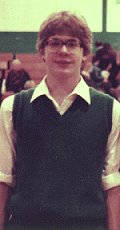 Thursday,
June 24, 1999. Consultation.
Thursday,
June 24, 1999. Consultation.
LASIK Eye Surgery
 Thursday,
June 24, 1999. Consultation.
Thursday,
June 24, 1999. Consultation.
Why am I doing this? Is it just vanity? We all break down. Our bodies fall apart. They just do. I can't stop the disintegration. No one can. It will happen. Think about other surgical procedures that "enhance" appearance. Aren't they all so obvious, so primitive, so unnatural that they appear freakish instead of attractive. Bad boob jobs, too many face lifts, these people don't stop the body from turning against them. We are frail. What lengths need to be approached to correct or cure our ails? Where do we draw the line?
Of course, no one seems to question getting braces. That's the one major surgical normalcy. Although, I guess a four-year process isn't really surgery, but it is invasive, and it does take what God gives you and tries to make it better. Is any other mutilation of the body as accepted? Pierced ears? Pierced noses? But even piercing crosses the line between fashionable and freakish. When is it OK to alter the package we come in?
Maybe it's the lasers that are freaky. At least with braces, we can all understand what's happening: you hook up these big, awful wires to your teeth and yank on them for years and eventually you force them into place. Brute force. The American way. It's the kind of system that the town blacksmith could orchestrate, given the opportunity. It's the medical equivalent of banging the top of the TV to improve the picture. But lasers! My goodness. There's no point of reference. No one uses lasers in real life so there's no natural extension to eye surgery. "Oh yeah, I use lasers to cut my lawn, so I can see how one might apply that same principle to the eyeball." It's science fiction. It's fantasy. Given the average American's exposure to lasers, the only reasonable question might be why one wouldn't use a light saber instead.
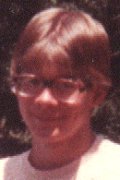 The
first phase of the day was an informational video. It has really
cool, adventurous, athletic people surfing and skiing and kayaking,
all without glasses, all happy and fun-loving. Then the dorks show
up, the goofballs, the unfortunates whose glasses keep them from
enjoying the outdoors, especially the kayaking. It's a cute little
video, with the sob story of having to wear glasses to the gym and
not being able to see in the morning. But it's like watching a
Hollywood romance. Each moment is calculated for effect, reaching
into the heart of the average glasses-wearing loser and bringing out
his biggest fears, his most annoying hardships. Their lives were
awful, but thanks to this one medical breakthrough, they are suddenly
happy, life-affirming people.
The
first phase of the day was an informational video. It has really
cool, adventurous, athletic people surfing and skiing and kayaking,
all without glasses, all happy and fun-loving. Then the dorks show
up, the goofballs, the unfortunates whose glasses keep them from
enjoying the outdoors, especially the kayaking. It's a cute little
video, with the sob story of having to wear glasses to the gym and
not being able to see in the morning. But it's like watching a
Hollywood romance. Each moment is calculated for effect, reaching
into the heart of the average glasses-wearing loser and bringing out
his biggest fears, his most annoying hardships. Their lives were
awful, but thanks to this one medical breakthrough, they are suddenly
happy, life-affirming people.
This was a useless video for me, almost counterproductive. I don't want or need the hype. I'm here, dammit. I know I want it, just convince me it'll all be OK. Sitting back down in the waiting room, I'm struck, not by how happy the people on the video had become, but by how unhappy I could be if it all goes wrong. And do I really need it? I don't go kayaking. And contacts have never been a problem in softball. I can feel the tears coming again as I picture the ultimate mistake, losing my vision during a procedure I didn't really need.
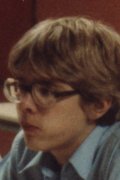 I
am shaken from my self-induced nightmare by other vision warriors
with their war stories and their battle scars. What encouraging
tidbits can I pick up? "He said his vision's worse then
ever," the man next to me bemoans. Oh, great. That's a bad one,
but the guy looked like crazy uncle Vito telling stories about a
friend of a friend of this guy he once knew. And on the other side of
me: "It's functional, but it's not perfect." Oh, I'm in the
wrong waiting room. I realize that I need to lower my expectations, I
guess. Prepare myself for functional. Prepare myself to need glasses,
just not as strong as the ones I have now. Wouldn't that be better?
Would that still be worth it? I mean, what's the point of tests and
lasers and cornea slicing and reshaping and permanent mysterious
physical change if you can't have perfection? I want to be healed. I
want to be all better.
I
am shaken from my self-induced nightmare by other vision warriors
with their war stories and their battle scars. What encouraging
tidbits can I pick up? "He said his vision's worse then
ever," the man next to me bemoans. Oh, great. That's a bad one,
but the guy looked like crazy uncle Vito telling stories about a
friend of a friend of this guy he once knew. And on the other side of
me: "It's functional, but it's not perfect." Oh, I'm in the
wrong waiting room. I realize that I need to lower my expectations, I
guess. Prepare myself for functional. Prepare myself to need glasses,
just not as strong as the ones I have now. Wouldn't that be better?
Would that still be worth it? I mean, what's the point of tests and
lasers and cornea slicing and reshaping and permanent mysterious
physical change if you can't have perfection? I want to be healed. I
want to be all better.
There's a gentleman next to me on the phone explaining the procedure to a family member, saying that he'll be the guinea pig for the whole family and see if it works. He then describes the procedure and its nuances. And he is wrong. He threw out a few facts that were simply not what I was told. So why does this concern me? I guess the more ignorant people are about the procedure, the less informed that makes their decision. Are people jumping onto a bandwagon that they have no idea where its heading? I want all Med School graduates or higher coming in here excited about the procedure. My own eye doctor two months ago was recommending LASIK and she wears glasses. "Why don't you do it?" I asked her. "Because I like glasses," she replied. Lies are not comforting.
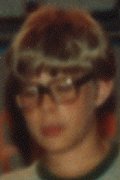 A
shared past unites people with bad vision, especially when it's as
bad as mine. We have our own sob stories of life-long poor vision,
waking up and not being able to see the alarm clock, not being able
to negotiate around the room, needing to reach immediately for
glasses. For someone who has worn glasses for all of their functional
life, the idea of perfect vision is enough to make you cry. The
unbelievablility of it all, the magic, the miracle. When I was
younger and used to envision finding a genie in a bottle, I would
often debate with myself whether, given only one wish, would I wish
for the ability to fly or wish for 20/20 eyesight? Both seemed
equally fantastic. Did I want to become abnormal and enjoy the
freedom of flight? Or was it more important to just be normal? To me,
at that time in my life, I needed a miracle to be normal.
A
shared past unites people with bad vision, especially when it's as
bad as mine. We have our own sob stories of life-long poor vision,
waking up and not being able to see the alarm clock, not being able
to negotiate around the room, needing to reach immediately for
glasses. For someone who has worn glasses for all of their functional
life, the idea of perfect vision is enough to make you cry. The
unbelievablility of it all, the magic, the miracle. When I was
younger and used to envision finding a genie in a bottle, I would
often debate with myself whether, given only one wish, would I wish
for the ability to fly or wish for 20/20 eyesight? Both seemed
equally fantastic. Did I want to become abnormal and enjoy the
freedom of flight? Or was it more important to just be normal? To me,
at that time in my life, I needed a miracle to be normal.
It's a nice office. It's a clean, sterile, professional room, simple decor, strong furniture. The woman sitting across from me is very professional, hair pulled back, not a strand out of place, flawless make-up. She wears a white jacket, complementing her white skirt, with white hose heading into white shoes, a vision of medicinal purity. She is speaking to me. She has said these words hundreds of times, four times today already and it's not even 10am. Her tone is calm, cool. The facts are there: success stories, the history of the procedure, small & temporary side effects. How could you not believe her? It all seems so natural to her. That's what we need. That's what I need.
If this is going to make any sense to me, it can't be a silicone breast implant destined to leak man-made toxins into my system, or some other ruthless, vain procedure like liposuction or a tummy tuck. This can't be something only a genie can pull off. It has to be sane, professional, and relatively simple. Don't actually explain the laser procedure too thoroughly because I obviously won't get it. Just give me some numbers and visuals that sum it up simply so that I can pretend I have a complete grasp of it. I have to be swept into the world where this happens every day. I have to feel like I'm getting my teeth cleaned or a blood test. It's the only way past the fear and the images of some horrible aftermath where I am blind at 50.
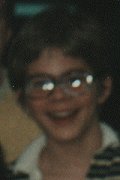 So
what helps the most? "We're working on an area that is 50-75
microns in thickness. A human hair is 125 microns." That was a
good visual, good numbers. And after I asked a follow-up question,
she told me, "This procedure does not weaken the eye. You can
still undergo surgery and other procedures later in life to correct
other eye ailments, such as cataracts." And no one has ever lost
their vision because of the procedure, so "we don't even get
into that." The facts are there, or at least there enough so
that I can't question them too much nor doubt them too much. Perfect
vision is within my grasp. 10,000 years ago, I would have been eaten
by a saber-tooth tiger during recess, never making it to puberty.
Today, I can regain 20/20 vision by having a beam of light shined
into my face. Sounds good. Sign me up.
So
what helps the most? "We're working on an area that is 50-75
microns in thickness. A human hair is 125 microns." That was a
good visual, good numbers. And after I asked a follow-up question,
she told me, "This procedure does not weaken the eye. You can
still undergo surgery and other procedures later in life to correct
other eye ailments, such as cataracts." And no one has ever lost
their vision because of the procedure, so "we don't even get
into that." The facts are there, or at least there enough so
that I can't question them too much nor doubt them too much. Perfect
vision is within my grasp. 10,000 years ago, I would have been eaten
by a saber-tooth tiger during recess, never making it to puberty.
Today, I can regain 20/20 vision by having a beam of light shined
into my face. Sounds good. Sign me up.
There are a few other options but none are for me: Radial Keratotomy, for people whose eyes are not as bad as mine, and corneal implants, for people whose vision is much worse than mine, if you can imagine that. LASIK is my one option, making that decision very easy.
During a quick tour of the facilities, which includes a couple of examining rooms, a few offices, and the laser room, we walked past a husband and wife as they awaited the actual surgery. The wife warned her husband, "It's very important that you look at the light during the procedure." My escort took a moment out of our tour to clarify, informing them, "It doesn't really matter if you look at the light. The doctor will tell you to look there, but don't worry too much about it."
The next phase for me was a typical eye exam, with reading charts and different lenses. ("What is better? One...? Or two...? This is two... Or one...?" If you've been there, you know exactly what I am talking about.) It was during this scene where I discovered that Michael Bolton would be in later for the LASIK procedure. That's not a useful fact, but it struck me as interesting.
My tech and I then went to do a map of my cornea using a small machine connected to a computer. When the technician typed in my name, she entered: DUCEY, KONH. My first impulse was that this was some code for the procedure I was about to undergo. When she changed the K to a J, though, it finally resembled my actual first name enough so that I jumped in. "It's H-N," I politely offered and she corrected her mistake. Not such a big deal, right? Oh my God! No. Huge deal. Huge. Huge. Deal. What if she was typing in my laser settings? I then have the distinction of being the first guy to ever go blind and the first guy to ever have the back of his brain lasered to the operating table. "Nurse. Something has gone horribly wrong. What has happened to the back of Konh's head?" Remember all that confidence I mentioned having. Slowly disappearing...
Lots of patients. Lots of young techs running tests. Lots of activity. And for me? Lots of time to sit and write. There is a process to all this and I'm caught up in the machinery. And is that good or bad? The natural tendency is to fear being just another number, another statistic, another procedure. You want special treatment, you want to be unique. But this may be the wrong place for that impulse. Here you want everything to go by the book. I want to be the same as hundreds of other successful patients. I want this all to go by the numbers and I want those numbers to be 20 and 20. Do the tests, type them into the computer (correctly), and let the laser do its thing.
A man just walked by and looked out the window at a distant object. "Yep. That was my test last time," he said as a big smile spread across his face and he scurried on to catch up to his technician. That's what I want. I want to be amazed. I want to be dazzled and blown away. I want to look at the world with my new eyes and think that I must still have my contacts in because the world looks so clear and sharp and oh so 20/20. I want to look out the window with glee.
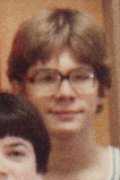 So
much sitting, so much waiting. At times I don't even know what I am
waiting for. Are they getting the place spruced up for Michael Bolton
or what? During my hours there, I see a handful of people walk by and
out of the office wearing protective goggles, Kareem Abdul Jabbar
wanna-bes. They have undergone the procedure. They look mostly dazed
and a little confused. One freshly-lasered patient ends up sitting
next to me. She is talking to her friends who have come to pick her
up. "I'm fine. It's fascinating. Absolutely fascinating. You're
a little blurry, but I can see you. You just lie there and see this
light. It's nothing. It's like nothing is being done. It's amazing.
The surgery is like three minutes. It's amazing. It's just
amazing." The gentlemen listen intently and then one of them
responds, "You know, one of your eyes is brown now."
So
much sitting, so much waiting. At times I don't even know what I am
waiting for. Are they getting the place spruced up for Michael Bolton
or what? During my hours there, I see a handful of people walk by and
out of the office wearing protective goggles, Kareem Abdul Jabbar
wanna-bes. They have undergone the procedure. They look mostly dazed
and a little confused. One freshly-lasered patient ends up sitting
next to me. She is talking to her friends who have come to pick her
up. "I'm fine. It's fascinating. Absolutely fascinating. You're
a little blurry, but I can see you. You just lie there and see this
light. It's nothing. It's like nothing is being done. It's amazing.
The surgery is like three minutes. It's amazing. It's just
amazing." The gentlemen listen intently and then one of them
responds, "You know, one of your eyes is brown now."
I finish up all of my tests and am finally just waiting to meet Dr. Maloney, although I'm not sure why really. Why do I even need to meet the man whose name proudly adorns the front doors and the letterhead of this Maloney Vision Institute? Is there anything special he does during the procedure? Do some moments call for his own interpretation? Or is he just the laser operator, no more highly skilled than the average projectionist at the local multiplex? I don't meet that 16 year-old when I go to the movies. I just enjoy his expert handiwork. Do I need to see the face of the man behind the laser?
OK, so I met him. And no, I didn't ask him if he was just a glorified projectionist. And yes, it does help to put a smiling, friendly, Harvard face on top of this mound of sterility and technology. He was very nice and we chatted about Harvard mostly. He took a look through one of his machines at my eyes and he uttered a single word -- "Perfect." No eye doctor has ever used that word in describing my eyes. Ever. He said he couldn't guarantee 20/20 since we had 'such a long way to go,' but that he would 'shoot for it.' I didn't really have any other questions for him. Everything had been covered thoroughly ahead of time. He and I shook hands and I guess that sealed the deal. I had been given the government seal of approval. Next stop... 20/20 Monday.
Sunday, June 27. The Day Before.
When I think about it, I want to cry. When I try to imagine myself coming out of the operating room, walking down the hall, re-emerging into the waiting area to see the same faces I had left behind only moments ago, but now to see them literally in a whole new way, when I try to see myself there in that situation, "post-op," I simply want to cry.
I don't know where the tears would come from exactly. The most simple explanation would be the profound sense of joy and relief that would overwhelm me now that such a difficult aspect of my life had been suddenly and miraculously cured with the sweep of a ray of light. Years of wishes on imaginary genie bottles would all suddenly be answered. I would be a new man. Cured. Saved. Healed. The other obvious explanation is my fear of something going wrong. If I am the one person in thousands who has something go wrong during the procedure, I will be crying at least on the inside as they escort me from the operating room. Those would be some bad tears, and I may be wanting to cry some now either in anticipation of those tears or to ward them off for tomorrow.
|
But there's still something else. As I was lying on the couch in my living room today, I looked around without my glasses on and everything had that familiar awful haze to it. Images on the TV were nothing but dancing blurs. Furniture had no texture, no features. Small items were always absent from this view. Detail was non-existent. And I realized that by tomorrow this would all be gone. My problem would be solved. But then what would be missing? What would be gone? I have spent many years of my life in a state of dependence on glasses and contacts to live any sort of normal life. I have woken up for the last twenty years with this very view of the world: fuzzy, blurry, hazy, mysterious, forbidding, scary. Until I put a pair of lenses in front of my face, I was lost in a sea of light bursts and murky shadows. And now, within twenty-four hours, that part of me would be gone. That part of who I am would be taken away from me forever. Is it wrong to feel sentimental for a malady? Or am a losing a small piece of my identity tomorrow? Bad vision is a part of me. Will I be less than whole tomorrow when I don't need glasses to navigate my apartment? Will there be a void in my life when I can finally open my eyes underwater again? It seems absurd to look at the words and contemplate the implications? |
|
|
What lessons have I learned from life because of my poor eyesight? Perhaps poise as we stopped the high school soccer game and two teams of varsity athletes scoured the grass for a lost contact? Patience as my eye doctor repeatedly told me I was too young to wear contacts and that I had to wait another year or more? Compassion when I was first told that I would need glasses in third grade and all of the jokes I had made at little four-eyed Amy Washburn's expense came rushing back to haunt me? Foresight when I got to Walt Disney World, Florida, one holiday season and couldn't enjoy many of the activities because I had simply forgotten to pack my glasses? Acceptance when I would look in the mirror and curse the dark rims on my little face and wish I didn't have to leave the house in such embarrassment, but would muster up the courage day after day and swallow my vanity and face the world? These were life experiences that shaped who I am. They were life experiences that I had because I had bad eyesight. |
|
|
Tomorrow I will be a radically different person. Tomorrow when I look in the mirror, I will be looking at and looking through a very different set of eyes. Is that OK? Am I doing something wrong? Am I abandoning who I am? Or are 30 years of life lessons enough? If you develop a tumor, you don't leave it in for old time's sake, right? And who is going to know? Almost nobody. My day-to-day life, since freshmen year in high school, has included contacts on my eyeballs from morning to night. My hatred of glasses abated when I didn't have to wear them any longer. I embraced contact lenses with a passion. It's hard to argue vanity as motivating this decision for surgery when I will look the same to all who know me. And, of course, I won't really be a radically different person. I will still be the same person, but if all goes as planned, I will be that person leaving Dr. Maloney's office tomorrow with 20/20 vision. And perhaps the last, great lesson I will take from a lifetime of vision problems and decades of frustration and agony and annoyance, is a fond appreciation for the wonder of sight, for the blessings of the world around me, and for the small miracle of modern technology that will make the tiniest whispered dream of a sad 10 year-old boy come true: I wish I had perfect vision. |
|
Monday, June 28. The Day
For the past few days I have been having a difficult time sleeping. I go to bed at night and then over the next hour or so wake up with the overwhelming sense that someone has broken into my apartment and is either out in the living room or more often has sneaked into my bedroom. Sometimes I can even see the outline of a body standing in the room before I fully wake up. As it continued to happen night after night, I started to wonder if the nightmares were connected to this upcoming surgery. Last night either my concerns were validated or my mind has gone beyond twisted.
I went to bed as usual and about 20 minutes later thought I heard someone moving around my kitchen. That's par for the course these days. As I come to, I always feel frustrated and powerless to overcome these subconscious cries for help. Still, I closed my eyes again and went back to sleep. Ten minutes later, I again dreamt their was someone in my apartment. I didn't notice him, however, until he was standing directly over my bed. He had a small tool like a screw driver and was pooping out my eyeball. He had broken in to steal my eyeball! I sat up quickly, scanned the blurry apartment, and laughed. Is all this related? I think so. I lay back down and slept soundly the rest of the night.
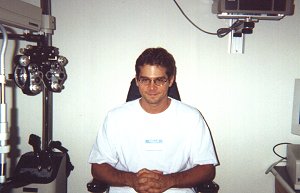 This
morning I awoke and looked at my clock. It has huge oversized
numbers on it so that I can see it from my bed. When I bought it a
few years ago, I was so relieved to finally have a clock that I
didn't have to dive out of bed and get 4 inches away from to be able
to tell the time. Now I lay there and looked at its fuzzy numbers for
presumably the last time. After today, those numbers should be clear
as a bell. I looked around the rest of the room. My closet was just a
long stretch of vertical bands, different colors bleeding into each
other. No distinct outfits or articles, just streaks of color. My
bookcase was row upon row of mushy little rectangular bands. No
words, no titles and authors. But tomorrow, all of those titles and
names should welcome me to the world. My way of life, everything I
know about waking up, the blurriest time of the day, all that changes
this afternoon. Today is the last day of an era.
This
morning I awoke and looked at my clock. It has huge oversized
numbers on it so that I can see it from my bed. When I bought it a
few years ago, I was so relieved to finally have a clock that I
didn't have to dive out of bed and get 4 inches away from to be able
to tell the time. Now I lay there and looked at its fuzzy numbers for
presumably the last time. After today, those numbers should be clear
as a bell. I looked around the rest of the room. My closet was just a
long stretch of vertical bands, different colors bleeding into each
other. No distinct outfits or articles, just streaks of color. My
bookcase was row upon row of mushy little rectangular bands. No
words, no titles and authors. But tomorrow, all of those titles and
names should welcome me to the world. My way of life, everything I
know about waking up, the blurriest time of the day, all that changes
this afternoon. Today is the last day of an era.
|
I'm back. The money has been paid. I guess that does it. One last look around with my old eyes and I'll be ready. OK. Ready. OK. OK, I'm ready. OK, they're not ready. That's fine. I mean, it's not like I'm nervous or anything, right? By my side is Lisa Cerasoli, who underwent a similar procedure years ago and has had 20/20 vision since. She is my pillar of support. (And my ride.) Robin, who welcomed us (and took my money) was quite sure that everything would go swimmingly. It's the easiest procedure ever. Everyone loves it. You're going to be so happy. If this were a Movie of the Week, she said everything you would expect to set up the horrible tragedy about to unfold: the laser malfunction, the human error, the coincidental mishaps piling on top of each other, and the for the next two hours we watch as my character copes with his sudden blindness and we're moved by his passion for life and ability to overcome such devastating life changes. I don't want to play that role today. |
|
|
|
It's time. We're escorted back to a prep room. They give us a post-op travel pack, complete with eye shields, geriatric sun glasses, and a slew of eye drops. This will be my recovery system for the next seven days. Besides that, I am now the proud owner and even more proud wearer of a medical shower cap, covering my hair and ears. Little by little, I am reaching a state of total readiness. A nurse executes a series of eye drops and three passes of iodine over and around my eyes to sterilize and begin to numb the area. A quick wash of the eyelids and I am ready. |
|
|
We entered the operating room and I lay down on the table. They put a sand pillow under my head to create a comfortable, stable, conforming cushion. Then I waited for the doctor. And waited. "He's not out drinking or anything, right?" |
|
Both nurses said no, but I thought they answered a little too quickly and a little too seriously. I fell asleep for a minute or two and then Dr. Maloney showed up and said hello to Lisa and me. |
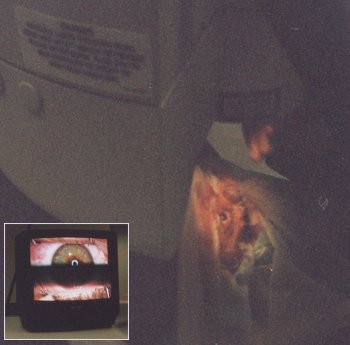
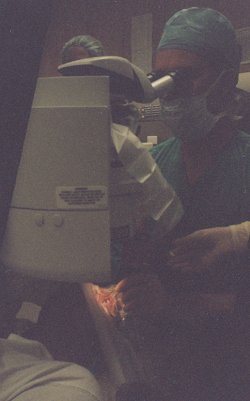 The
procedure began. Keep in mind that the entire time Dr. Maloney is
talking, describing what is happening and what I should hear and/or
feel. It went something like this... He taped a sterile cloth around
my eye and inserted a clip under the eyelids to keep them from
blinking. (Think Clockwork Orange.) He applied some drops and
some liquid to wash the eye. Then I felt pressure all around my
eyeball as if he were trying to pop a zit out my eyeball. Then
everything went black. I heard a buzzing sound. Then my vision
returned. The whole time I have been looking up at the infamous red
light. It is now a red blur. I continue looking at it. I can see a
tiny instrument peel back a layer from my eye and the red light
becomes even blurrier. I can see a sponge dabbing my eye. It's like
watching a movie where things are happening to the camera so they're
right up against the screen. Then the procedure. I could hear the
laser clicking while I looked at the red blur. The laser operated for
less than 30 seconds. (The doctor's comments during this time were,
"That's very good. Perfect. Very nice. It's going well.")
The clicking came to a stop and the flap was placed back over my eye.
The area was flushed with a liquid and then a blast of air and then a
little more liquid. The clip came off, the tape came off and the eye
was done.
The
procedure began. Keep in mind that the entire time Dr. Maloney is
talking, describing what is happening and what I should hear and/or
feel. It went something like this... He taped a sterile cloth around
my eye and inserted a clip under the eyelids to keep them from
blinking. (Think Clockwork Orange.) He applied some drops and
some liquid to wash the eye. Then I felt pressure all around my
eyeball as if he were trying to pop a zit out my eyeball. Then
everything went black. I heard a buzzing sound. Then my vision
returned. The whole time I have been looking up at the infamous red
light. It is now a red blur. I continue looking at it. I can see a
tiny instrument peel back a layer from my eye and the red light
becomes even blurrier. I can see a sponge dabbing my eye. It's like
watching a movie where things are happening to the camera so they're
right up against the screen. Then the procedure. I could hear the
laser clicking while I looked at the red blur. The laser operated for
less than 30 seconds. (The doctor's comments during this time were,
"That's very good. Perfect. Very nice. It's going well.")
The clicking came to a stop and the flap was placed back over my eye.
The area was flushed with a liquid and then a blast of air and then a
little more liquid. The clip came off, the tape came off and the eye
was done.
Rinse. Repeat.
Two eyes were fixed in less than six minutes. I sat up and got my bearings. The results were immediate. As I stepped off the table, I opened my eyes to navigate around the room. Lo and behold, I could see. There was no doubt; my vision had improved. Everything was still a little blurry, but only as if there was a thin layer of water over my eye. I could see Lisa and the room and the hallway and everything around me remarkably clearly. But I guess the big question remained: Was it 20/20 vision? There was no way to tell.
|
|
The next stop was clean-up. We went back to the prep area and they washed the iodine off my face. I was instructed to keep my eyes closed the whole time, but the temptation was great to test the results of the procedure. I could see pretty far but with the cloudiness, there was still no way to ascertain the extent of the correction. Most definitely I would be able to drive during the day without glasses or contacts. I could tell that already. And as I sat there furtively opening and shutting my eyes, I realized how incredibly wonderful the miracle I had just undergone was. My eyes were working like a normal pair. God had come down and placed a finger on my faulty eyeballs and made them whole again. And the blind shall see. |
|
|
We waited again for a technician to take a final look into my eyes. She did and didn't seem to find anything wrong. That meant we were free to go. She had us open up the eye shields and put them on. It was time for the Kareem Abdul Jabbar look. I had seen many people leaving with these goggles on last time and now it was finally my turn. We collected our belongings and made our way up to the front desk. They had me put on the geriatric shades over the eyeshields. Now I became senior citizen Kareem Abdul Jabbar. I made an appointment for tomorrow and left the building. Tomorrow we would know more. |
|
Tuesday, June 29. The next day.
I awoke and lay in bed, eyes closed. I peeked over at the clock to see what time it was but I didn't want to look elsewhere. I didn't want to know. I was afraid to know. What had happened? What were the results? As I looked around the room, it became obvious that it's pretty hard to see through the protective goggles that I had to wear to bed. As I removed them and looked again, I knew my vision was markedly better. But it was still blurry and my eyes and head were sore. It wasn't the miracle morning-after wake-up that I had heard of and dreamt about. Fine. No need to panic.
I spent the morning in my apartment, applying drops and doing things around the house. I would occasionally stop to test my eyes and see how blurry different objects in the house were. It was hard to tell exactly. The blurriness came and went. My left eye was recovering slower than the right. The drops helped but occasionally my eyes felt uncomfortable. I got in the shower around noon and got ready to go back to the doctor's office for my follow-up. Once in the car and on the road, I could tell. It was true. It had worked. I looked around me at cars, at hillsides, at signs and signals. There was virtually no difference between my current vision and my vision with contacts or glasses. I tried not to celebrate yet. I wanted to hear it from the doctor, from the mouth of a professional.
I parked and excitedly entered the doctor's office. Twenty-four hours ago I was sitting in the same lobby and could see just as well. The difference? Yesterday I had glasses on. I wanted to look out the window at some point of reference I had picked out yesterday to compare, but I hadn't done that. I had to wait. Was it 20/20? In moments I would know...
One of the nurses took me into the exam room. We looked at a couple of lines of letters. I read the first two lines easily but I could only make out a few of the letters in the last line. That frustrated me. It angered me. I had gotten my hopes up for perfect. On the drive over, I felt I had a sure thing. I would have bet any money on 20/20. Now a bunch of fuzzy letters laughed at me and mocked my foolishness. I didn't want to fall short now. "Oh, that last line is 20/15 vision. The line above it is 20/20. Your vision is perfect, almost better than perfect." Wonderful words. Wonderful numbers. 20 and 20. Together again. Not since some unknown moment in my preschool years when my eyes started down their long path of steady deterioration had the numbers 20 and 20 been used together to describe my vision. Today that's what my chart said.
The rest of the day today I saw a couple of friends and did relatively tame activities, trying to rest my still weary eyes. Walking around Studio City seemed normal, natural. It had always looked like this to me. But every once in a while I would remind myself that this is my vision now. Not my altered vision, or my corrected vision, or my vision with contacts or glasses. This is now my vision, every hour of every day, from the moment I awake until I lay my head down to sleep. I have 20/20 vision. It worked. Tragedy was avoided. The miracle is mine. The prayer was answered. Someone was listening.
OK, now about that "being able to fly" thing...
Wednesday, December 15. Six months later.
I'm back. It's been six months since my surgery and once again I am in the swank offices of the Maloney Vision Institute. In one corner, a man watches the goofy video. To my left, a woman sits with dark glasses on. MuzakTM plays quietly, soothing the surgical warriors. I am under the impression that today will go very smoothly. My eyes feel fine, they see fine, I really couldn't be happier. I am hoping to get the quick stamp of approval and be sent on my way, a full-fledged graduate of the 'Institute.'
And that was about how it ended up going. I waited only a few minutes, just long enough to write that little blurb and then one of the doctors took me in. We did a quick reading of the 20/15 line (the smallest letters they've got), he looked deep into my eyes (could barely see any scarring), and I was told to never set my foot in that office again.
He and I both were impressed with the success of the surgery from a
physical standpoint. And I am also impressed with the results from a
psychological standpoint. This is who I am now. I'm a guy with
perfect vision. I don't need to pack contact lens solution for trips,
my eyes don't get sticky and uncomfortable late at night, I don't
take anything out of my eye to go to bed or put anything into it in
the morning. Yes, I did that for 13 years, but I don't now and, God,
I love it. Six months later and I absolutely love it. I want to
recommend it to everyone. I know the fears and I know the risks and I
would feel terrible if I suggested it to someone and then something
went wrong, but for me, it was worth it. Obviously the risk was worth
it because I went through with it, and looking back now (with perfect
vision) it went as wonderfully as I had ever imagined. It's truly amazing.